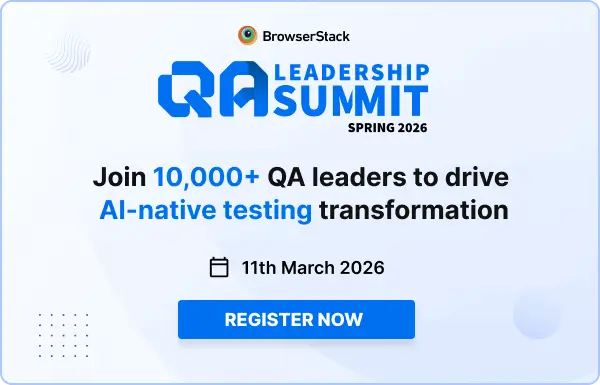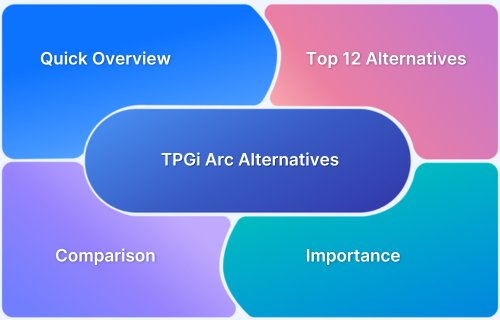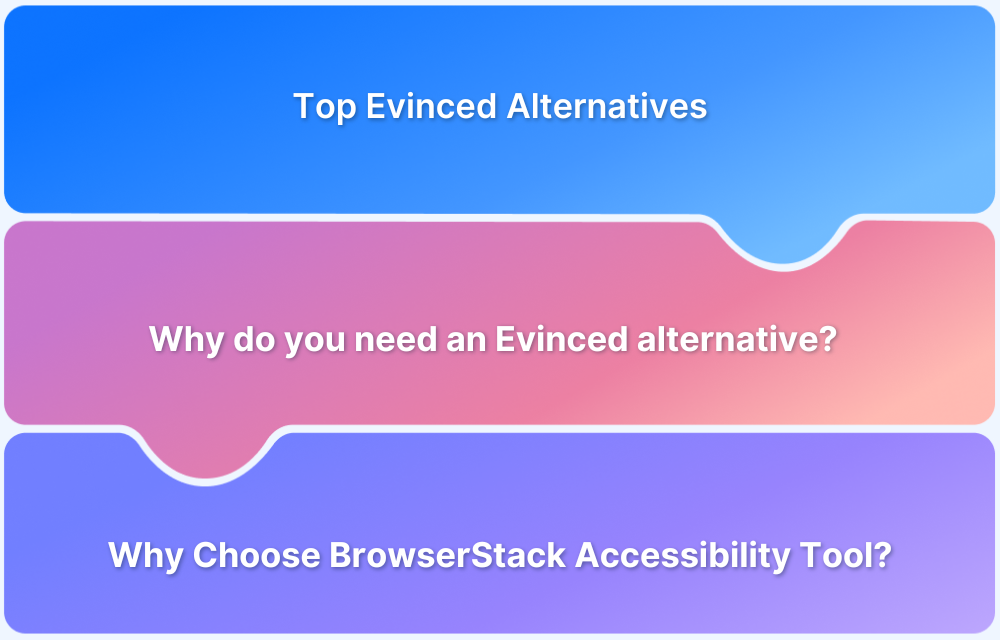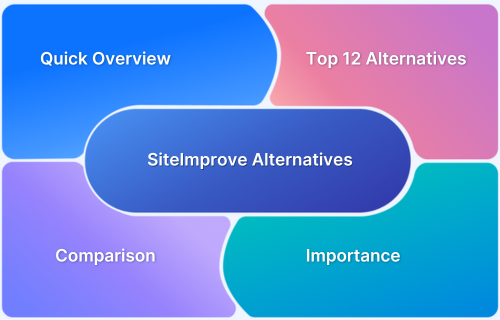When selecting a mobile app accessibility testing solution, Abra is a well-known choice due to its comprehensive ecosystem of tools for automatic detection, tracking, and remediation of accessibility issues.
Overview
Here are top 14 Abra.ai Alternatives
- BrowserStack App Accessibility Testing: Offers real-device testing, seamless CI/CD integration, and automated WCAG detection for mobile app accessibility.
- Level Access Mobile Accessibility Testing: No-code, cloud-based mobile accessibility testing tool optimized for iOS and Android, offering real and virtual device testing.
- Tenon Accessibility Testing: API-based accessibility testing tool designed for integration into development pipelines, offering customizable accessibility validation.
- Google Accessibility Scanner: A free Android app that scans mobile apps for common accessibility issues and provides suggestions for improvements.
- TalkBack Accessibility :Android’s built-in screen reader app, offering real-time feedback for manual accessibility testing.
- Xcode Accessibility Inspector: A macOS tool integrated with Xcode for inspecting and testing the accessibility of iOS and macOS apps.
- AudioEye Mobile App Audits: A service platform combining automated scans and expert manual audits for mobile app accessibility compliance.
- ACCELQ: A low-code automation platform supporting web and mobile accessibility testing with integration for CI/CD workflows.
- Pa11y: An open-source command-line tool and web dashboard for automated accessibility testing with CI/CD integration.
- TestGrid Accessibility Testing: A cloud-based platform offering real-device testing and accessibility evaluations for faster, comprehensive mobile app testing.
- Gamma Technologies Accessibility Tools: A suite of accessibility auditing and testing tools focused on compliance and expert support for complex requirements.
- Appium: An open-source automation tool for mobile UI testing, supporting accessibility testing through plugins for iOS and Android.
- Espresso: Android’s native UI testing framework, providing accessibility testing features integrated with Android Studio.
- WAVE (Web Accessibility Evaluation Tool): A suite of accessibility testing tools offering visual feedback and reports, primarily for web and mobile-web content.
However, for teams looking for more flexibility, scalability, or lower-cost alternatives, exploring other solutions can provide unique benefits.
This article will highlight the top Abra alternatives and help you decide which solution is best for your needs.
What is Abra?
Abra is a mobile app accessibility testing platform designed to simplify the detection and management of accessibility issues.
Key Features:
- Abra Cloud: Cloud-based accessibility testing for mobile apps with collaborative team workflows.
- Abra Desktop: Test Android and iOS apps via connected devices or simulators.
- Abra SDK: Integrate automated accessibility checks directly into the app development process.
- Centralized Dashboard: Track, manage, and prioritize accessibility issues across teams.
- Abra Academy: Training and resources to upskill teams on accessibility best practices.
- Expert Consulting: Audits, testing, and guidance from accessibility specialists.
- Technical Coverage: Ensures compliance with text scaling, color contrast, and screen reader standards.
Why Look for Abra Alternatives?
While Abra is a comprehensive tool for accessibility testing, there are several reasons teams might look for alternatives:
- Pricing Transparency: Abra’s pricing is not publicly disclosed, requiring direct inquiries for full suite costs, making it difficult to budget without a personalized quote.
- Platform Limitations: Abra Desktop is currently only available on macOS, limiting access for teams using other operating systems.
- Learning Curve: As a specialized platform, Abra can require significant time and training to maximize its value, which may not be ideal for teams with limited resources.
- Limited Reviews and Benchmarking: With few independent reviews available, it’s difficult to evaluate how Abra stacks up against competitors in terms of features and performance.
- Automation and Integration Limitations: While Abra offers semi-automated workflows, some teams may need more extensive automation and deeper integration with existing CI/CD pipelines.
Exploring Abra alternatives can provide more flexibility, better pricing models, and enhanced features that meet your team’s specific accessibility needs.
Top 14 Abra.ai Alternatives
Below are the top 14 Abra alternatives, each offering unique strengths in accessibility testing to help you find the right fit for your team’s needs.
Here is a detailed description of each of these tools.
1. BrowserStack Accessibility Testing
BrowserStack App Accessibility Testing is a cloud-based platform that helps teams automate mobile app accessibility compliance on real iOS and Android devices, supporting regulations like EAA and ADA.
It uses the Spectra™ Rule Engine for best-in-class automated WCAG issue detection, covering focus order, touch target size, missing labels and more.
The platform enables plug-and-play test automation, integrates seamlessly into CI/CD pipelines, and provides immediate access to comprehensive issue reports.
With support for real device cloud testing, BrowserStack App Accessibility ensures testing covers device and OS-level accessibility nuances.
Key Features of BrowserStack App Accessibility
- Spectra™ Rule Engine: Automated detection of 20+ WCAG success criteria issues such as focus order, missing labels, and touch target sizes, with support for both common and complex problems in a single scan.
- AI-powered contextual guidance: Issues are auto-deduplicated, grouped, and presented with AI-driven guidance to accelerate remediation.
- Real device testing: Test accessibility on thousands of real Android and iOS devices, eliminating the need for physical labs or ongoing maintenance.
- Support for screen readers: Validate app accessibility with real assistive technologies including VoiceOver (iOS) and TalkBack (Android) across both phones and tablets.
- Catches emulator-missed issues: Identify and fix accessibility issues that emulators may overlook by testing with real UIs, OS-level interactions, and custom skins.
- Plug-and-play automation: Integrate accessibility checks directly into CI/CD pipelines using the BrowserStack SDK, enabling rapid automation setup.
- Zero maintenance: Continuous monitoring and issue reporting as builds evolve, without requiring maintenance of test infrastructure.
- Central Reporting Dashboard: Access detailed post-scan reports with auto-deduplicated and grouped issues by severity and WCAG criteria for straightforward fixes.
- Visual scanner: Test app UIs visually, with reports highlighting the specific impact of accessibility issues, making remediation more actionable.
- Scalable execution: Supports automated reporting for any number of test runs to keep up with frequent deployments.
- Comprehensive coverage: Offers one of the most extensive accessibility testing platforms for mobile apps, uniquely enabling screen reader testing in a virtual mobile lab.
Pricing
- Free Plan: Unlimited On-demand Website Scans and Scan user workflows up to 5 unique pages
- Test & Monitor Plan: Starts from $199 per month
- Automate & Monitor: $459 per month
- Enterprise: Contact Sales
Try App Accessibility Testing for Free
2. Level Access Mobile Accessibility Testing
Cloud-based, no-code mobile app accessibility testing tool optimized for iOS and Android, allowing teams to test on real and virtual devices.
Key Features:
- Zero-install, no-code live app testing.
- Compliance with WCAG and mobile-specific guidelines.
- Cross-platform real and virtual device testing.
- Centralized issue tracking and developer integration.
Pros:
- Very easy for teams with varying technical skills.
- Aligns with corporate IT and security policies.
- Detects issues missed by native tools.
Cons:
- Pricing not disclosed publicly.
- Limited automation and CI/CD pipeline focus.
- Cloud-only service may not suit all organizations.
Pricing: Contact for custom pricing
3. Tenon Accessibility Testing
API-based accessibility testing tool designed for integration into development and testing pipelines focusing on automated and customizable accessibility validation.
Key Features:
- REST API for automated accessibility testing.
- Customizable rule sets for domain-specific needs.
- Detailed reporting and fix suggestions.
- CI/CD and DevOps pipeline integration.
Pros:
- Flexible and programmable.
- Easy integration into workflows.
- Strong reporting capabilities.
Cons:
- Primarily web focused with limited native app features.
- Requires tech skills to configure and use.
- Pricing based on usage volume.
Pricing: Starts at $49/month.
Read More: SiteImprove Alternatives
4. Google Accessibility Scanner
A free Android app that scans mobile apps for common accessibility issues and suggests improvements. Widely used by developers to quickly identify accessibility problems directly on Android devices.
Key Features:
- Automated app scans highlighting accessibility issues
- Contextual explanations with suggested fixes
- Integration with Android Studio for developer workflow
- Detects common issues like contrast, touch target size, and labels
Pros:
- Free and easy to use
- Provides instant, practical feedback
- Seamless integration with Android development tools
Cons:
- Android-only platform
- Detects mainly common issues, not complex scenarios
- No support for real-device testing beyond Android phones
Pricing: Free
5. TalkBack Accessibility
Android’s native screen reader, essential for manual accessibility testing, simulating a real user’s experience navigating via assistive technology.
Key Features:
- Real-time screen reading for UI elements
- Gesture-based navigation and keyboard shortcuts
- Feedback for text, buttons, images, and other elements
- Customizable speech rate and verbosity
Pros:
- Pre-installed and free on Android devices
- Provides authentic user perspective on accessibility
- Crucial for manual and exploratory testing
Cons:
- Android-only
- Requires expertise to test effectively
- No automated testing
Pricing: Free
6. Xcode Accessibility Inspector
A macOS tool integrated with Xcode for inspecting and testing the accessibility of iOS and macOS apps using native assistive technologies.
Key Features:
- Inspect accessibility properties on UI elements
- Screen reader simulation with VoiceOver
- Audit highlighting missing or misconfigured accessibility attributes
- Keyboard and focus navigation testing
Pros:
- Native Apple ecosystem support
- Deep UI and accessibility insights
- Free with Xcode
Cons:
- Limited to iOS/macOS
- Manual and semi-automated testing
- Requires familiarity with Xcode and Apple accessibility standards
Pricing: Free (with Xcode)
7. AudioEye Mobile App Audits
A service-oriented platform combining automated accessibility scanning with detailed manual audits for mobile app compliance and user experience improvements.
Key Features:
- Automated accessibility scans covering WCAG and ADA
- Manual audits by expert testers using assistive technologies
- Actionable remediation guidance and compliance reports
- Live user testing for real-world validation
Pros:
- Combines automation and human expertise
- Recommended for compliance certification
- Supports custom audit scopes and workflows
Cons:
- Custom pricing and potentially high
- Less automated than full tool solutions
- Dependent on external service scheduling
Pricing: Custom (contact AudioEye)
Learn More: TPGi Arc Alternatives
8. ACCELQ
Low-code automation platform supporting web and mobile testing, including accessibility features for CI/CD workflows.
Key Features:
- Scriptless test automation with accessibility validation
- Integration with CI/CD platforms like Jenkins
- Comprehensive test coverage across platforms
- Detailed reporting with issue categorization
Pros:
- Simplifies creation of accessibility tests
- Supports multiple platforms including mobile
- Enables continuous integration of accessibility checks
Cons:
- Pricing not public, typically enterprise-focused
- Requires automation expertise
- Heavy setup for complex workflows
Pricing: Custom
9. Pa11y
Open-source command-line tool and web dashboard for automated web accessibility testing with CI/CD integration.
Key Features:
- Command-line interface for scripting tests
- Customizable accessibility rulesets
- Detailed reporting and logging
- CI/CD integration support
Pros:
- Free and open-source
- Highly flexible and customizable
- Strong developer pipeline integration
Cons:
- Requires technical expertise for setup
- Limited visual interface
- Primarily web-focused
Pricing: Free
10. TestGrid Accessibility Testing
Cloud-based platform combining real-device testing with accessibility evaluations for faster, comprehensive app testing.
Key Features:
- Real-device accessibility evaluations
- Automated WCAG 2.2 compliance checks
- Test replays and detailed issue reporting
- Integration with CI and test systems
Pros:
- Consolidates functional and accessibility testing
- Supports WCAG 2.2 and mobile accessibility best practices
- Real-device testing improves accuracy
Cons:
- Pricing not publicly available
- Onboarding may be required for complex setups
- Smaller market presence
Pricing: Custom
11. Gamma Technologies Accessibility Tools
A focused suite for accessibility auditing and testing of mobile apps, emphasizing compliance and expert support for complex requirements.
Key Features:
- Manual and automated testing options
- Detailed compliance and gap analysis reports
- Integration with development and test workflows
- Expert consulting included
Pros:
- Specialist in compliance-heavy environments
- Comprehensive reports with remediation advice
- Supports complex audit requirements
Cons:
- Higher cost, enterprise-focused
- Less automation emphasis
- Smaller user community
Pricing: Custom
12. Appium
Open-source automation tool for mobile UI testing with plugin support for accessibility testing across iOS and Android apps.
Key Features:
- Cross-platform test automation
- Accessibility plugin support
- Supports common testing frameworks
- CI/CD pipeline integration
Pros:
- Free and open-source
- Broad support and community
- Flexible and customizable
Cons:
- Steep setup and coding required
- No dedicated UI for accessibility tests
- Manual maintenance of test scripts
Pricing: Free
Must Read: 19 Best Accessibility Testing Tools
13. Espresso
Android’s native UI testing framework, including accessibility testing features integrated with Android Studio.
Key Features:
- UI test automation with accessibility assertions
- Integration with Android Studio
- Fast test execution
- Keyboard and screen reader accessibility support
Pros:
- Native to Android, no additional tools required
- Fast and reliable testing
- Free and well-supported by Google
Cons:
- Android-only
- Requires programming expertise
- No cross-platform support
Pricing: Free
Also Read: Accessibility Training for Designers
14. WAVE (Web Accessibility Evaluation Tool)
Accessibility testing suite providing visual feedback and reports, primarily for web and mobile-web content.
Key Features:
- Visual issue indicators on webpages
- Browser extensions for Chrome and Firefox
- WCAG and Section 508 support
- API for batch accessibility testing
Pros:
- Free tier available
- Easy-to-use with visual feedback
- Helpful for designers and developers
Cons:
- Limited native mobile app testing
- Primarily web-focused
- No CI/CD integration
Pricing: Free and paid plans
Why Choose BrowserStack App Accessibility Testing?
BrowserStack App Accessibility Testing helps ensure that mobile apps meet accessibility standards across real devices and browsers. With seamless integration into your CI/CD pipeline and AI-driven testing, it simplifies the process of validating accessibility and compliance, improving the user experience for people with disabilities.
- Real Device Testing: Test accessibility on real devices to ensure accurate results across a wide range of environments.
- Comprehensive Coverage: Validate your app’s compliance with WCAG, ADA, and Section 508 standards.
- AI-Powered Automation: AI-driven analysis detects common accessibility issues and suggests fixes, reducing manual effort.
- Seamless CI/CD Integration: Easily integrate accessibility testing into your existing DevOps workflow for continuous validation.
- Detailed Reporting: Receive clear, actionable reports with visual logs, severity ratings, and recommendations for improvements.
Conclusion
Choosing the right alternative to Abra.ai depends on your team’s specific needs, whether it’s scalability, ease of integration, or advanced AI capabilities.
The top 14 alternatives listed offer diverse features, from AI-driven automation to seamless integrations with other platforms, ensuring there’s a solution for every use case.
By exploring these options, teams can enhance productivity, streamline workflows, and ultimately deliver smarter, more efficient solutions.
Useful Resources for Accessibility
- Web Content Accessibility Testing: An Essential Guide
- 10 Most Common Web Accessibility Issues to Solve for
- Must-Have Chrome Extensions for Accessibility Testing
- Quick Website Accessibility Testing Checklist
- Cypress Accessibility Testing (with Best Practices)
- Mobile App Accessibility Testing Checklist
- Top 15 Accessibility Automation Tools
- How to Automate Accessibility Testing
- 20 Best Accessibility Testing tools (WCAG and ADA Testing Tools)
- How to Test Websites with Screen Readers
- Must-have Chrome extensions for WCAG Testing
- 508 Compliance Testing Tools








